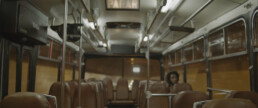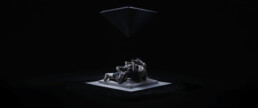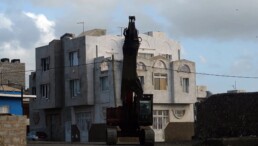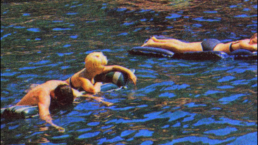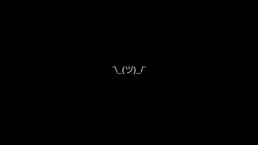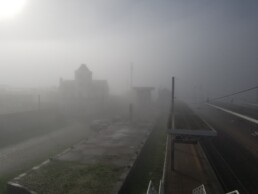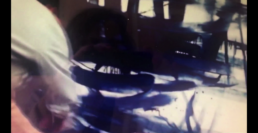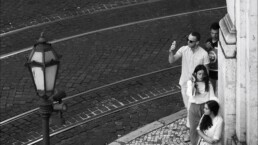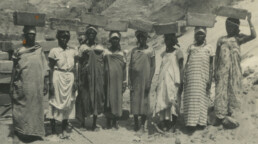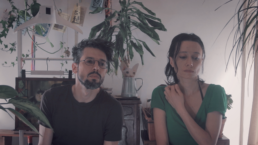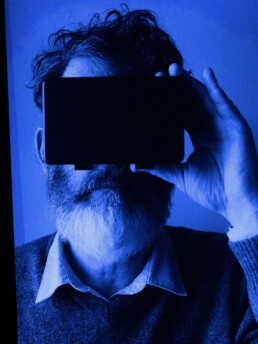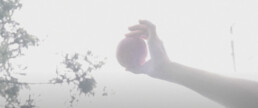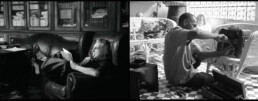FUSO INSULAR 2020 – 29 a 31 de Outubro
30 Outubro, 21h30
Igreja do Colégio, Ponta Delgada
ESTRUTURAR O TEMPO
Curadoria: Jean-François Chougnet
“When you are making video, you’re giving structure to time, which is what a composer does.”
Bill Viola
Mais do que nunca, o Open Call do Fuso 2020 revela – no difícil contexto da pandemia- a diversidade das práticas da vídeo arte feita em Portugal e/ou por artistas portugueses. 176 projetos foram submetidos, o que é mais um sinal da vitalidade da cena contemporânea portuguesa, projectos propostos por jovens artistas, mesmo muito jovens artistas (muitos projectos foram apresentados por artistas nascidos na década de 1990). Voltamos a selecionar um conjunto de obras que surpreendem pela persistência e diversidade de olhares. Este conjunto de filmes mostra, de facto, caminhos insólitos e provocadores, e desafia as nossas perceções sobre a videoarte. O programa de 10 obras aqui apresentado favoreceu imagens nômades e poéticas, e tem a ambição de sugerir uma reflexão sobre o estado das imagens hoje, tentando “compor” uma estrutura do tempo.
Jean-François Chougnet
WE ARE ALL ON THE SAME BUS – Nuno Serrão
2019, 1’59’’
Estamos todos no mesmo autocarro. Se considerarmos o conceito espaço-tempo de Einstein, acabamos com um objecto onde tudo o que aconteceu e tudo o que irá acontecer, encontra-se compreendido no seu interior. Através dele, somos conduzidos por um veículo, vamos chamar de autocarro, completamente autónomo, que segue numa única direCção, para a frente, e possui uma única janela, a traseira. A esse veículo, o astrónomo Arthur Eddington chamou A Seta do Tempo. Esta ideia, embora deprimentemente determinista, é difícil de ignorar perante a já comprovada plasticidade do tempo, mesmo quando consideramos o Princípio da incerteza de Heisenberg, onde o acto de observar algo, altera o seu resultado. Conceito que não invalida um Universo determinista, antes, permite a Interpretação de Muitos Mundos de Hugh Everett, também conhecida como Multiverso.
EXTRACTION: THE RAFT OF THE MEDUSA (FOR INTERDEPENDENCE) – Salomé Lamas
2019/2020, 10’
Extraction: The Raft of the Medusa é uma meditação sobre o redesenho maciço da humanidade no planeta e um panfleto distópico no antropoceno.
Extração: A Jangada da Medusa retrata um breve momento de euforia, enquanto os ocupantes à deriva na jangada, esperando e rezando para serem resgatados, parecem vislumbrar uma possibilidade de salvação. Quase podemos ouvir os gritos roucos através dos quais eles tentam chamar a atenção para sua situação desesperada, reunindo uma última gota de força diante do vazio. Esta é sua última chance de sobrevivência.
Extração: A Jangada da Medusa refere-se ao paradigma colonial, visão de mundo e tecnologias que marcam regiões de alta biodiversidade, a fim de reduzir a vida à sua conversão em um recurso através do capitalismo, com um enorme impacto ambiental e social. É uma alegoria para estados de emergência em política ambiental, clima e migração, com um objetivo ético-político.
METALHEART – Welket Bungué
2020, 7’
Prémio Aquisição Fundação EDP/MAAT (escolha do júri)
Um corpo cheio de marcas do passado, cicatriza mágoas do passado e esconde perdas vivas. Aqui pulsa um coração invulnerabilizado pelo ruído, ferro e torção. Hoje as nossas fronteiras estão mais limitadas do que nunca. Quem são os confinados/as, quem decide quem pode entrar e fazer parte ou não?! Devemos lidar com a migração como se fosse um cadáver envenenando a nossa mansuetude, ou é uma pergunta real que o capitalismo imperialista ocidental evita a todo o custo responder? A questão é: você está disposto/a a encarar esta premissa (anti)ética?
LETTERS TO NOWHERE – Kopal Joshy
2018, 10’15’’
Prémio Incentivo RESTART (escolha do público)
Ao atravessar a banalidade e o peso das palavras que viajam nos cartões postais, Letters to Nowhere é uma cine-carta que olha as palavras escondidas fora de um envelope lacrado. Este poema visual conta a história de um momento frágil na vida da protagonista e dos seus entes queridos. Ela testemunha e narra através dos seus olhos infantis, tanto naquela época como agora. Através do ato de ocultar as palavras do passado, abre-se de novo um diálogo sobre a vulnerabilidade familiar através de vozes desconhecidas por detrás de cartas anónimas.
I HAVE A DREAM – Júlio F. R. Costa
2020, 4’45’’
I Have a Dream é uma obra acerca dos sonhos ainda por concretizar, e acerca da tirania e futilidade que impede que eles se realizem.
PRÓXIMA PARAGEM – Florence Weyne Robert
2019, 7’28’’
No coração de Lisboa, um bairro à beira Tejo, poucas ruas entre a linha de comboio e o Rio. Velhotes vivem seus últimos momentos de vida enquanto prédios luxuosos estão sendo construídos, desenhando assim uma nova camada social neste bairro praticamente abandonado. Meus encontros deram-se num café ali numa esquina, e principalmente com velhotas do bairro. Elas contam-me o bairro, o seu presente, o seu passado através de suas próprias vidas.
O PECADO DE JOÃO PALOLO – Rita Azevedo Gomes
2020, 5’26’’
O Ah! das coisas: O Pecado de João Palolo. No extenso e estranho isolamento em que nos vemos – estranho porque não se reconhece em nenhum outro antes imaginado, e porque a ligação ao mundo é singularmente virtual – as memórias de vida vêm por encantamento. A extensão do tempo dá-lhes espaço, ocupam. Há uma irrealidade surpreendente nas coisas, nos gestos. Vemos mais próximo. A série de ensaios O Ah! das coisas, acontece neste tempo que é simultaneamente de espanto e de pavor. O Ah!, são fantasias em filme da festa das memórias. O pecado de João Palolo é isso. Feito a lembrar João (António) Palolo, o amigo que me falava do azul cobalto, e de quem não cheguei a despedir-me. Assim, aparece, na pintura.
HELLO TOMORROW – Nuno Cera
2020, 3’49’’
Prémio Menção Honrosa (escolha do júri)
Hello Tomorrow é um vídeo realizado entre o Verão de 2018 e o Verão de 2020 a partir da minha casa na Rua da Madalena, no centro histórico de Lisboa. O projeto testemunha e observa a passagem do tempo, explora as mudanças neste epicentro da cidade e questiona as relações e conexões entre todos nós, na nossa aparente diversidade. A casa torna-se o observatório, abrigo íntimo para uma introspecção, mas sempre na presença dos outros. À sequência dos dias e das noites, as relações cósmicas acontecem na fuga do olhar para o céu. A cidade transforma-se do aparente familiar ao muito estranho, da presença à ausência dos corpos e dos seus movimentos.
Hello Tomorrow como documento, como memória para o futuro, o que fica na dicotomia entre hiper densidade, capitalismo e o vazio, realizado no momento da grande “pausa humana”. É também um alerta irónico sobre a ignorância, o largo num bairro antigo como o universo. Da micro-economia dos imigrantes, ao turismo massificado e também como local de refúgio para as pessoas em situação de sem-abrigo. Um argumento poético pelo palco urbano, pronto para uma convivência inclusiva ainda para nascer…
MY FATHER HAS A GUN – Ana Mendes
2019, 6’27’’
My father has a gun é um video que conta a história do pai de Ana Mendes, enquanto soldado na guerra colonial Portuguesa em Guiné-Bissau, explorando, ao mesmo tempo, o papel da fotografia no negócio da guerra.
CORPOS P̶ALIMPSÉSTICOS MNEMÓNICOS – Renata Ferraz e Flávio Almeida
2020, 8’59’’
Corpos P̶a̶l̶i̶m̶p̶s̶é̶s̶t̶i̶c̶o̶s̶ Adversos faz parte da série Corpos Palimpsésticos, concebido logo após a separação do casal de artistas em Março de 2020, quando decidiram fazer o luto através de um gesto criativo, resultando em obras de videoperformance. A criação ocorreu durante o confinamento voluntário dos dois, juntos na mesma casa. Deste encontro inusitado, aberto a atravessamentos de uma relação porvir, estabeleceram conversas com o luto e as adversidades causadas pelo novo vírus e pelos vermes que tem ressurgido e tomado as rédeas da nossa história actual.
FUSO INSULAR 2020 – October 29th to 31st
October 29th, 9.30pm
Igreja do Colégio – Ponta Delgada
THE STRUCTURING OF TIME
Curator: Jean-François Chougnet
“When you are making video, you’re giving structure to time, which is what a composer does.”
Bill Viola
The Fuso 2020 Open Call once again reveals – within the tricky context of the pandemic- the diversity of video art practices made in Portugal and/or by Portuguese artists. 176 projects were submitted, which is a strong signal of the vitality of the Portuguese contemporary scene. Young artists, even very young artists – born in the 1990s – have submitted projects of great strength and originality. We selected a set of works that surprise by their persistence and diversity of gazes. The program of 10 works presented in this session, shows nomadic and poetic images, offering a reflection on the status of images today, trying to “compose” a structure of time.
Jean-François Chougnet
WE ARE ALL ON THE SAME BUS – Nuno Serrão
2019, 1’59’’
We are all on the same bus. If we consider Einstein’s concept of space-time, we end up with an object in which everything that happens and everything that will happen is contained in its interior. Through it, we are driven by a vehicle, we will call it a bus, which is completely autonomous, which goes in a single direction, forward, and has a single window, the back window. The astronomer Arthur Eddington called this vehicle The Arrow of Time. This idea, although depressingly determinist, is difficult to ignore given the already proven plasticity of time, even when we consider Heisenberg’s Principle of Uncertainty, in which the act of observing something alters its result. A concept which does not invalidate a deterministic Universe, but rather allows for Hugh Everett’s Many-worlds Interpretation, also known as the Multiverse.
EXTRACTION: THE RAFT OF THE MEDUSA (FOR INTERDEPENDENCE) – Salomé Lamas
2019/2020, 10’
Extraction: The Raft of the Medusa is a meditation on humanity’s massive redesign of the planet and a dystopic pamphlet on the anthropocene.
It portrays a brief moment of euphoria as the drifting occupants on the raft, hoping and praying to be rescued, appear to glimpse a possibility of salvation. We can almost hear the hoarse cries through which they attempt to draw attention to their desperate plight, mustering a final ounce of strength before the void. This is their last chance of survival.
Extraction: The Raft of the Medusa refers to the colonial paradigm, worldview, and technologies that mark out regions of high biodiversity in order to reduce life to its conversion into a resource through capitalism, with an enormous environmental and social impact.
It is an allegory for states of emergency in environmental policy, climate and migration, with an ethical-political purpose.
METALHEART – Welket Bungué
2020, 7’
EDP/MAAT Foundation Acquisition Award (jury’s choice)
A body full of the marks of the past heals its past hurts and hides living losses. Here beats a heart made invulnerable by noise, iron, and twist. Our boundaries are today tighter than ever. Who are the confined ones, who decides who can and cannot enter?! Shall we deal with migration as if it were a dead body poisoning our meekness, or is it a real question that imperial western capitalism doesn’t want to answer? The question is: are you willing to stand and confront this (un)ethical premise?
LETTERS TO NOWHERE – Kopal Joshy
2018, 10’15’’
RESTART Incentive Award (public’s choice)
Traversing between the banality and the weight of words travelling via postcards, Letters to Nowhere is a cine-letter looking at words concealed outside of a sealed envelope. This visual poem tells the story of a fragile time in the life of the protagonist and her loved ones. She witnesses and narrates through her childish eyes, then and now. Through the act of concealing the words of the past yet again, a dialogue about a familiar vulnerability is opened through unfamiliar voices behind anonymous letters.
I HAVE A DREAM – Júlio F. R. Costa
2020, 4’45’’
I Have a Dream is a work about dreams yet to be realized, and about the tyranny and futility that prevent their realization.
PRÓXIMA PARAGEM – Florence Weyne Robert
2019, 7’28’’
In the heart of Lisbon, a neighbourhood on the margins of the Tejo, a few streets between the train tracks and the River. The elderly live out their final moments, while luxury buildings are being built, thereby laying down a new social layer in this neighbourhood, which has been practically abandoned. My encounters took place there, at a café on the corner, and mainly with the elderly ladies from the neighbourhood. They tell me of the neighbourhood, its present, its past, through their own lives.
O PECADO DE JOÃO PALOLO – Rita Azevedo Gomes
2020, 5’26’’
Ah! of things: The Sin of João Palolo. In the extensive and strange isolation in which we find ourselves – strange because it is not previously imagined, and because our connection to the world is now singularly virtual – memories of life come through enchantment. The extension of time gives them space; they occupy. There is a surprising unreality to things, in gestures. We see more closely. The series of essays The Ah! of things, happens during this time, which is simultaneously one of astonishment and horror. The Ah!, is a sequence of fantasies in film of the ‘feast of memories’. That’s what The Sin of João Palolo is. Made while remembering João (António) Palolo, the friend who spoke to me about cobalt blue, and to whom I never said goodbye. Thus, he appears in paintings.
HELLO TOMORROW – Nuno Cera
2020, 3’49’’
Honorable Mention Award (Jury’s choice)
Hello Tomorrow was created between the Summer of 2018 and the Summer of 2020, from my home on Rua da Madalena, in the historical center of Lisbon. The project bears witness to and observes the passage of time, explores the changes in this epicenter of the city and questions the relationships and connections between all of us, in our apparent diversity. Home becomes an observatory, an intimate shelter for introspection, but always in the presence of others. The sequence of the days and nights, the cosmic relationships occur in the gaze´s escape to the sky. The city transforms from the apparently familiar to the very strange, from the presence to the absence of bodies and their movements.
Hello Tomorrow as document, as a memory for the future, of what remains in the dichotomy between hyper density, capitalism and the void, created at the moment of the great “human pause”. It is also an ironic alert on ignorance, a square in a neighbourhood which is as old as the universe. From the micro-economy of immigrants, to mass tourism, and also a place of refuge for the homeless. A poetic plea for the urban, ready for an inclusive coexistence that has yet to be born…
MY FATHER HAS A GUN – Ana Mendes
2019, 6’27’’
My father has a gun is a video that tells the story of Mendes’ father as a soldier during the Portuguese colonial war in Guinea-Bissau, whilst speculating about the role of photography in the business of war.
CORPOS P̶ALIMPSÉSTICOS MNEMÓNICOS – Renata Ferraz and Flávio Almeida
2020, 8’59’’
Corpos P̶a̶l̶i̶m̶p̶s̶é̶s̶t̶i̶c̶o̶s̶ Adversos is part of the Corpos Palimpsésticos series, conceived right after the split of the artist couple in March 2020. At that time, they decided to live their mourning through a creative gesture, resulting in video performance pieces. The creation took place during their voluntary confinement, together in the same house. From this unusual meeting, open to the transforming of a relationship of becoming, they established conversations with the mourning and the adversities caused by the new virus, and the maggots that have re-emerged and taken the reins of our current history.
